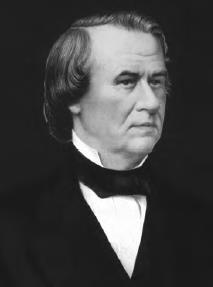No, the U.S. Supreme Court ruled in Clinton v. City of New York (1997; see LegalSpeak, p. 31) that the president did not have the constitutional authority to repeal, or nullify, a federal law once it becomes law. “There is no provision in the Constitution that authorizes the president to enact, amend, or to repeal statutes,” the Court wrote in striking down the Line Item Veto Act of 1996. The Supreme Court made clear that there is a difference between a president vetoing a bill before it becomes law and a president canceling part of a law after it has already become law.

U.S. President Andrew Johnson, who succeeded Abraham Lincoln, was the first president to be impeached when he was brought to trial in 1868, but he was acquitted (Library of Congress).

